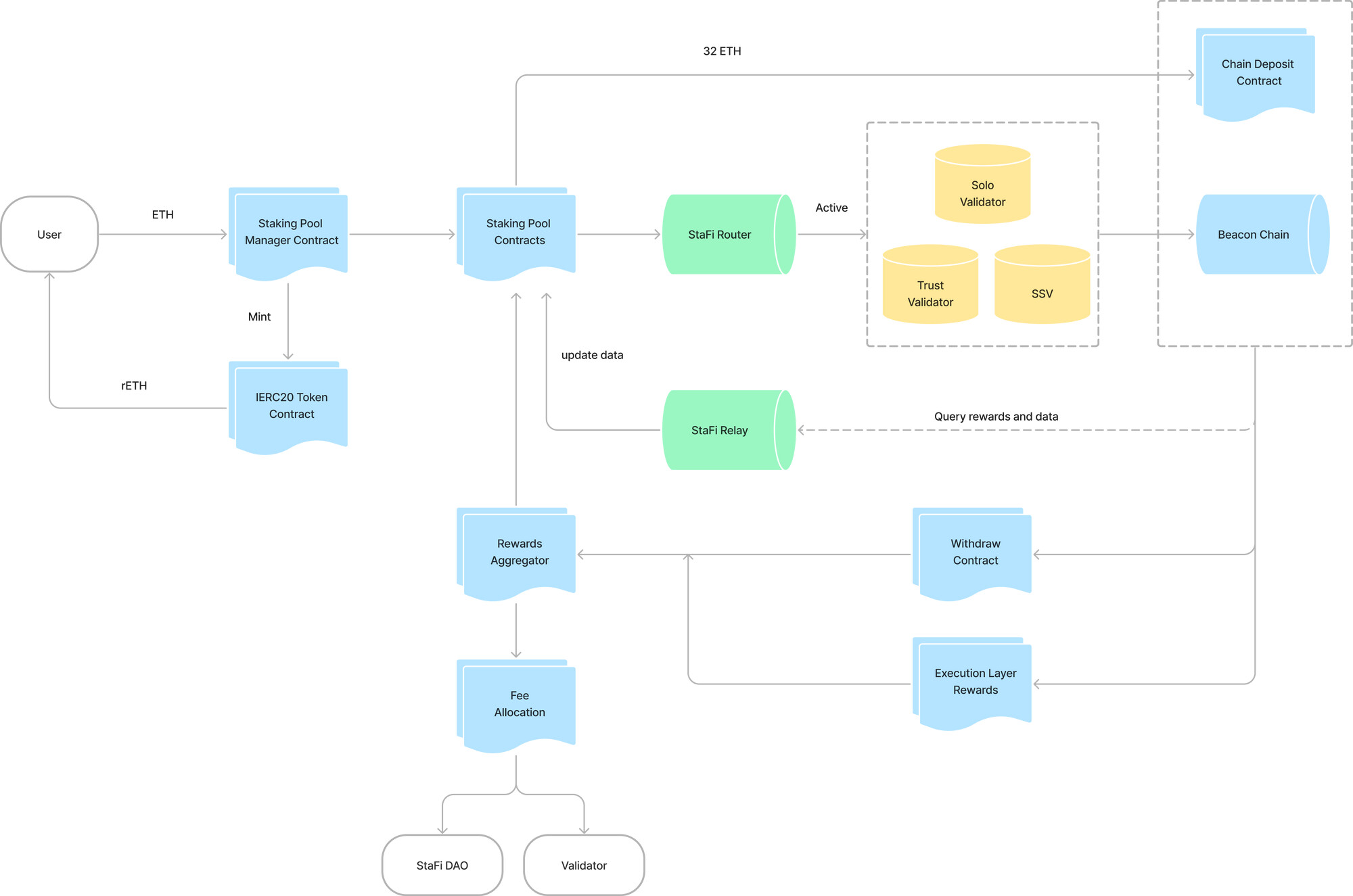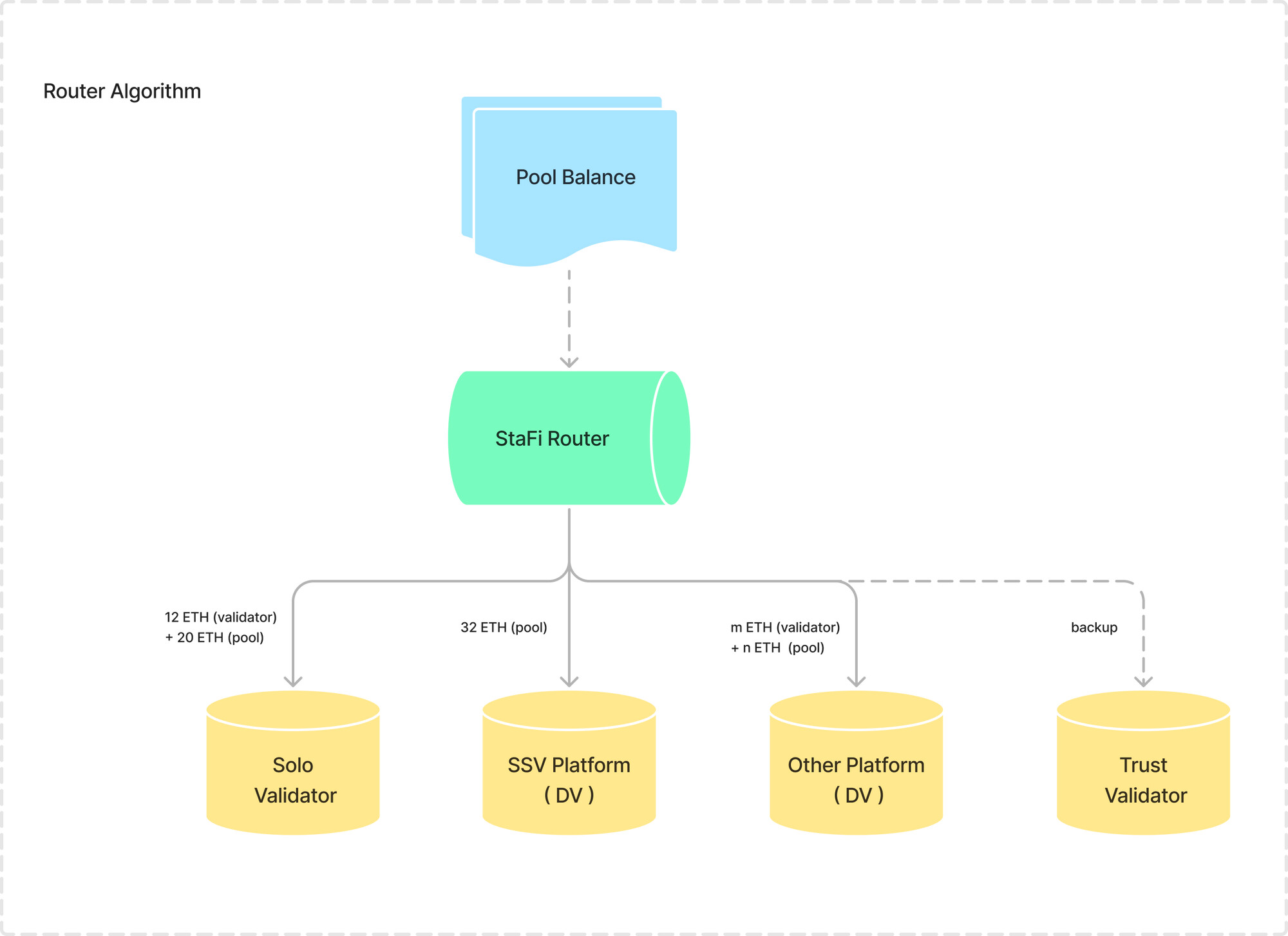Distributed Validator
DVT (Distributed Validator Technology), by allowing validators to run on multiple nodes or machines, has the potential to significantly enhance the decentralization and security of Ethereum. In light of this, StaFi has decided to integrate DVT into its ETH liquid staking service via a new module called StaFi Router, which will enable us to implement this technology and further enhance the security and decentralization of the Ethereum network.
Benefits of the DVT
- Safety (against key theft): The Validator's staking private key is secure unless security is compromised at more than M of the N Co-Validators.
- Safety (against slashing):
- Under the assumption of an asynchronous network, the Validator is never slashed unless more than 1/3rd of the Co-Validators are Byzantine.
- Under the assumption of a synchronous network, the Validator is never slashed unless more than 2/3rds of the Co-Validators are Byzantine.
- Liveness: The protocol will eventually produce a new attestation/block under partially synchronous network unless more than 1/3rd of the Co-Validators are Byzantine.
Tradeoffs of the DVT
- Increased Complexity: As with any multi-node deployment, there are now more moving parts to running a validator as a whole. This requires limited coordination across the different operators in the cluster, and adds potential areas for things to go wrong.
- Latency: DVT introduces a few additional network hops by the consensus mechanism and message sharing across nodes in a cluster. This, however, is mitigated by designing DVT to use direct P2P connections across nodes in a cluster (rather than a singular gossip network).
- Operational Costs: As multiple nodes are required to participate instead of just a single node, there are increased operational and hardware costs. This can be offset by being able to run more validators on the same set of machines due to the improved resiliency of validators running DVT.
How StaFi integrates DVT
StaFi Router
The current StaFi ETH liquid staking validator function supports trust validators and solo validators. To support DVT and accommodate future expansion of validator types, we have developed a new module called Router. Router will integrate existing validator services with upcoming SSV support and use its allocation algorithm to assign user staked ETH to the corresponding validator.

General module
- Staking Pool Manager Contract:Handling user operations such as staking, unstaking, or withdrawing.
- IERC20 Token Contract: rETH token contract on Ethereum.
- Staking Pool Contracts: Implementation of the core functions of the staking pool.
- Ethereum Deposit Contract: Ethereum staking deposit contract
- StaFi Router: A router used for validator selection, activation and management.
- StaFi Relay: Off Chain: Data synchronization and scheduled trigger to update era.
Router Algorithm
The Router will monitor the events and balance of the staking pool. The pool will set aside a specific amount of ETH for withdrawals. If the pool’s valid balance exceeds 20 ETH, users can choose to deposit 12 ETH as a solo validator and use their own server or SSV to activate the validator on the Beacon Chain. This activation process needs to be done manually. Once the pool’s valid balance exceeds 32 ETH, the Router will automatically generate a validator key, register a validator with SSV, and activate the validator on the Beacon Chain.
To increase decentralization, we plan to decrease the number of trust validators and use them only as a backup.

SSV Integration
StaFi Router integrates with SSV using its contract, API and SDK.
Struct: Task
type Task struct {
taskTicker int64
stop chan struct{}
eth1StartHeight uint64
eth1Endpoint string
eth2Endpoint string
superNodeKeyPair *secp256k1.Keypair
ssvKeyPair *secp256k1.Keypair
gasLimit *big.Int
maxGasPrice *big.Int
storageContractAddress common.Address
ssvNetworkContractAddress common.Address
ssvNetworkViewsContractAddress common.Address
seed []byte
// --- need init on start
dev bool
chain constants.Chain
superNodeConnection *connection.Connection
ssvConnection *connection.Connection
eth1WithdrawalAdress common.Address
superNodeContract *super_node.SuperNode
userDepositContract *user_deposit.UserDeposit
ssvNetworkContract *ssv_network.SsvNetwork
ssvNetworkViewsContract *ssv_network_views.SsvNetworkViews
nextKeyIndex int
validators map[int]*Validator
eth2Config beacon.Eth2Config
}A structure containing all relevant information about the SSV integration.
Struct: Validator
type Validator struct {
privateKey *bls.PrivateKey
keyIndex int
status uint8
registedOnSSV bool
removedOnSSV bool
}A structure containing all relevant information about the SSV validator.
- function
checkAndRegisterOnSSV: select operator and register validator to SSV contract - function
checkAnddRepairNexKeyIndex: generate validate key - function
checkAndDeposit: check the pool balance and init validator - function
checkAndStake: active validator
Distribute Validator Key Generate
As the development of SSV’s DKG is currently in progress, the process of generating Validator Keys requires careful consideration of performance and security to ensure a high level of decentralization.
In the long term, once SSV’s DKG is completed, we will replace the current scheme with SSV’s DKG to further enhance security and decentralization.
smart operator selection
SSV operators are evaluated based on various metrics such as price, status, and performance, as well as dynamic operations such as updated fees and off-boarding. To ensure optimal operator selection, the StaFi Router will periodically search for operator information on the SSV network at certain frequencies.
SSV related api:
/api/v4/{network}/operators: SSV operator list/api/v4/{network}/operators/operator: SSV operator detail